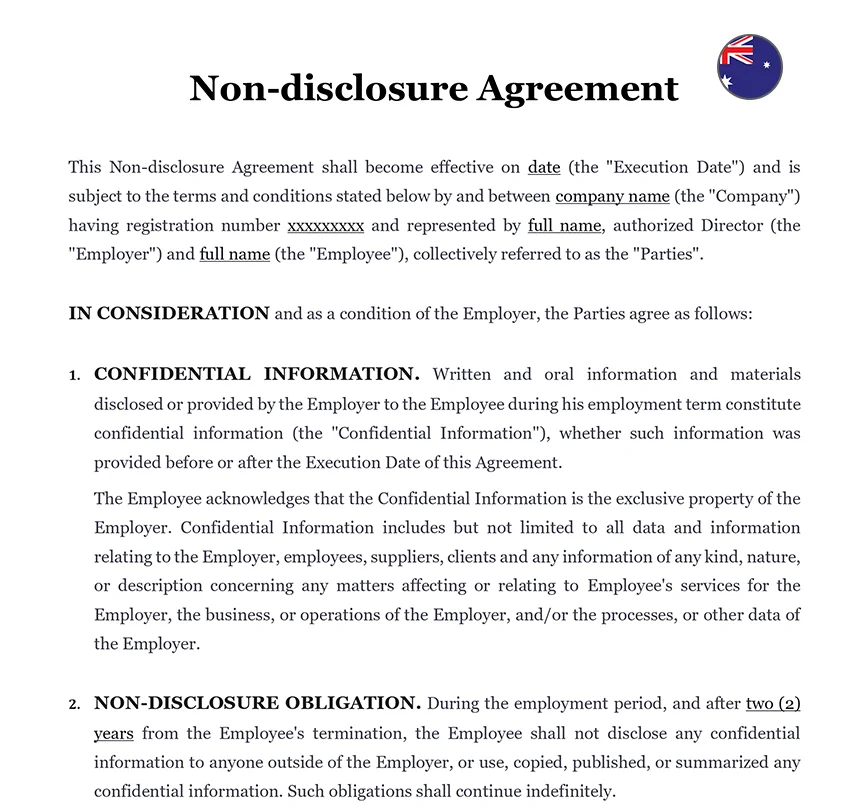Ready to use legal template
Drafted by experienced lawyers
Compliant with Australian law
Ready to use legal template
Drafted by lawyers
Compliant with Australian law
Learn more about Employee Confidentiality Agreement in Australia
An employee confidentiality agreement, also known as a nondisclosure agreement (NDA) or a confidentiality clause aims to protect sensitive information and trade secrets belonging to the employer by prohibiting the employee from disclosing or using such information for unauthorized purposes. It typically covers a wide range of confidential information, including but not limited to, customer lists, proprietary technology, business strategies, financial data, and any other proprietary information relevant to the employer’s business operations.
Table of contents
-
What is the purpose of an employee confidentiality agreement in Australia?
-
What are the key elements included in an employee confidentiality agreement in Australia?
-
How do businesses ensure compliance with employee confidentiality agreements in Australia?
-
Are there any legal requirements governing employee confidentiality agreements?
-
How do employee confidentiality agreements protect the interests of employers in Australia?
-
What are the consequences of breaching an employee confidentiality agreement in Australia?
-
How can employers draft effective employee confidentiality agreements?
What are the key elements included in an employee confidentiality agreement in Australia?
The purpose of an employee confidentiality agreement in Australia is to protect the sensitive information, trade secrets, proprietary knowledge, and intellectual property of the employer. These agreements aim to ensure that employees understand their obligations to maintain confidentiality regarding confidential information obtained during the course of their employment. By signing a confidentiality agreement, employees commit to safeguarding the employer’s confidential information from unauthorized disclosure or misuse, both during and after their employment.
What are the key elements included in an employee confidentiality agreement in Australia?
Key elements typically included in an employee confidentiality agreement in Australia may comprise:
1. Identification of the parties involved (employer and employee)
2. Definition of confidential information covered by the agreement
3. Obligations of the employee to maintain confidentiality and use confidential information only for authorized purposes
4. Exceptions to confidentiality obligations, such as disclosures required by law or with the employer’s consent
5. Duration of confidentiality obligations, including post-employment obligations
6. Consequences of breach, such as termination of employment, injunctive relief, or monetary damages
7. Governing law and dispute resolution mechanisms
How do businesses ensure compliance with employee confidentiality agreements in Australia?
Businesses can ensure compliance with employee confidentiality agreements in Australia by providing comprehensive training and education to employees regarding their obligations under the confidentiality agreement, ensuring they understand the importance and specifics of maintaining confidentiality. Implementing robust security measures and access controls to protect confidential information from unauthorized access or disclosure is crucial. Clearly communicating expectations regarding the handling and storage of confidential information through written policies and procedures helps set clear guidelines. Regularly monitoring and auditing compliance with confidentiality obligations, including access logs and document tracking systems, ensures ongoing adherence to policies. Enforcing consequences for breaches of confidentiality, such as disciplinary action or legal remedies, deters misconduct and reinforces the importance of maintaining confidentiality.
Are there any legal requirements governing employee confidentiality agreements?
While there are no specific laws governing employee confidentiality agreements in Australia, these agreements are subject to general contract law principles and equitable doctrines. Confidentiality agreements must be:
| ➤ While there are no specific laws governing employee confidentiality agreements in Australia, these agreements are subject to general contract law principles and equitable doctrines. Confidentiality agreements must be |
| ➤ Reasonable in scope, duration, and geographical coverage to be enforceable. |
| ➤ Supported by valid consideration (benefit) for the employee in exchange for agreeing to the confidentiality obligations. |
| ➤ Additionally, confidentiality agreements may be subject to common law duties of confidentiality and fiduciary duties owed by employees to their employers. |




